If you're looking to keep your pool warm all season long, you can't go wrong with our top five propane pool heaters of 2024. The Hayward W3H400FDP excels with its powerful 400,000 BTU output, perfect for larger pools. For smaller spaces, consider the Pentair MasterTemp with its efficient 125,000 BTU. The Raypak models offer versatility, with options from 105,000 to 206,000 BTU, suitable for various elevations and pool sizes. All these heaters provide speedy heating and durable construction, ensuring your pool remains inviting. Stay tuned to discover more about features that suit your specific needs!
Table of Contents
- 1 Hayward Pool Heater, 400,000 BTU (W3H400FDP), Tan
- 2 Raypak 014786-156A Propane Gas Pool Heater 150K BTU for 0-1999ft Elevation
- 3 Pentair MasterTemp 125,000 BTU Propane Gas Heater for Small Pools
- 4 Raypak 105,000 BTU Swimming Pool and Spa Heater – Propane
- 5 Raypak 206,000 BTU Digital Electronic Ignition Propane Pool Heater
- 6 Factors to Consider When Choosing Propane Pool Heaters
- 7 Frequently Asked Questions
- 8 Wrapping Up
Hayward Pool Heater, 400,000 BTU (W3H400FDP), Tan
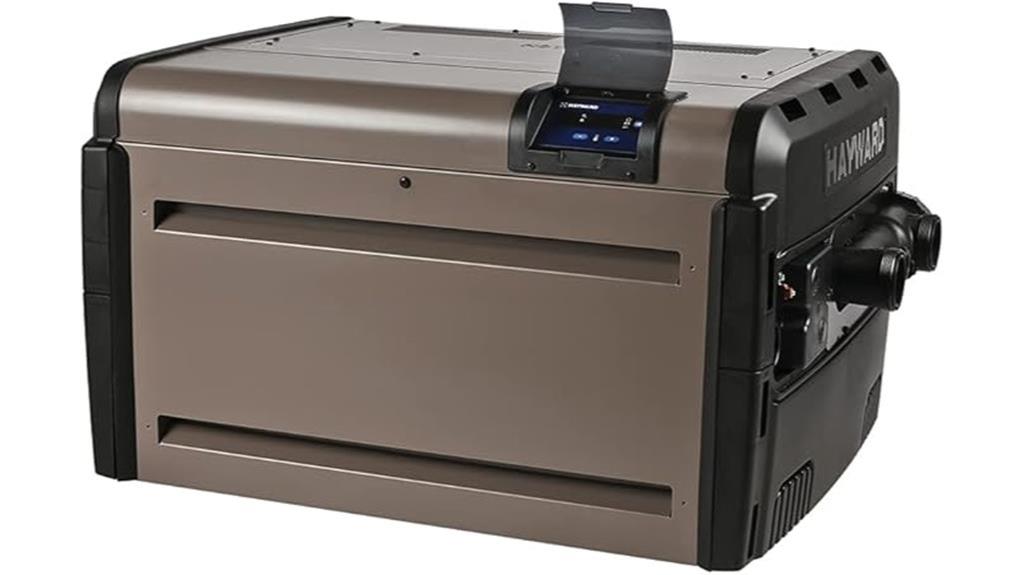
If you're looking for a powerful and efficient way to heat your pool or spa, the Hayward Universal H-Series 400,000 BTU propane heater (W3H400FDP) could be the perfect fit. This heater boasts a fast speed-to-heat capability, making it ideal for pools and spas up to 1,200 ft². Its durable cupro nickel heat exchanger resists corrosion, ensuring longevity and reliability. However, some users have reported mixed experiences, particularly regarding installation and customer support. It's crucial to connect it properly to power and gas, as it doesn't come with hose connectors. While it offers significant energy savings, be prepared for high fuel consumption during initial heating phases. Overall, it's a robust option, despite a few bumps along the way.
Best For: Those who need a high-capacity heater for large pools or spas and prioritize quick heating efficiency.
Pros:
- Fast speed-to-heat capability, raising temperatures quickly.
- Durable cupro nickel heat exchanger resists corrosion for long-term reliability.
- Energy-efficient design reduces circulation pump run time, leading to potential savings.
Cons:
- Installation can be challenging and requires proper connections; hose connectors are not included.
- Mixed customer support experiences, especially regarding warranty claims.
- High fuel consumption noted during initial heating phases.
Raypak 014786-156A Propane Gas Pool Heater 150K BTU for 0-1999ft Elevation
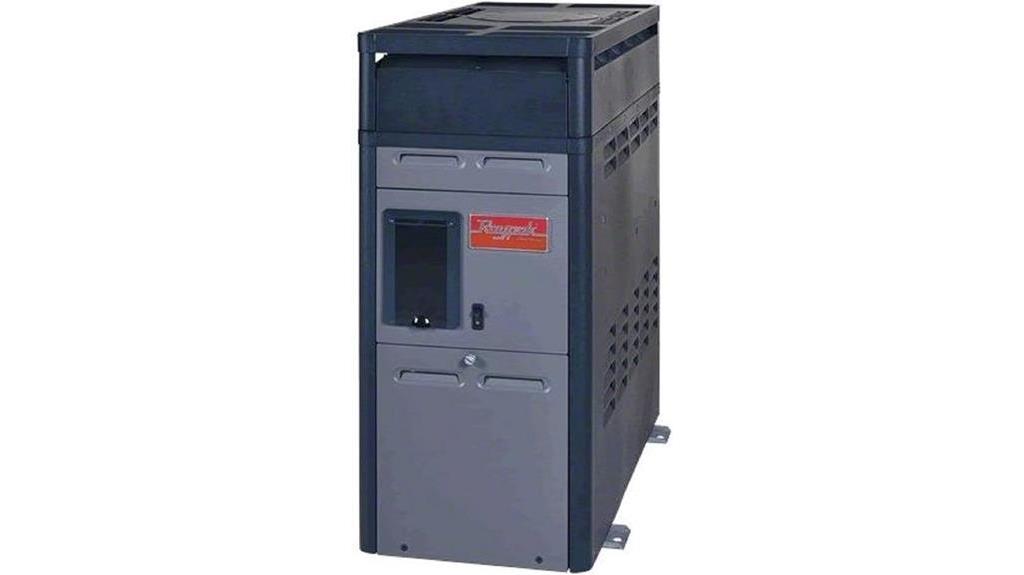
The Raypak 014786-156A Propane Gas Pool Heater stands out as an excellent choice for pool owners at elevations between 0 and 1999 feet, thanks to its robust 150K BTU output. This heater features a high-quality copper fin tube heat exchanger that maximizes heat transfer, ensuring your pool stays warm even in cooler climates. I appreciate its AFT digital control panel, which includes safety features and a microprocessor-controlled thermostat for precise temperature management. Installation is straightforward, though a gas line setup might require professional help. While some users have reported challenges with customer service and warranty claims, many praise its efficient heating and quiet operation. Overall, it's a solid option for maintaining comfortable pool temperatures.
Best For: Pool owners at elevations between 0 and 1999 feet looking for an efficient and reliable heating solution.
Pros:
- High-quality copper fin tube heat exchanger for maximum heat transfer.
- User-friendly AFT digital control panel with safety features and precise temperature management.
- Efficient heating performance, maintaining comfortable water temperatures even in cool climates.
Cons:
- Potential challenges with customer service and warranty claims reported by some users.
- Installation may require professional assistance, especially for gas line setup.
- Inconsistent experiences with product defects and service availability noted by certain customers.
Pentair MasterTemp 125,000 BTU Propane Gas Heater for Small Pools
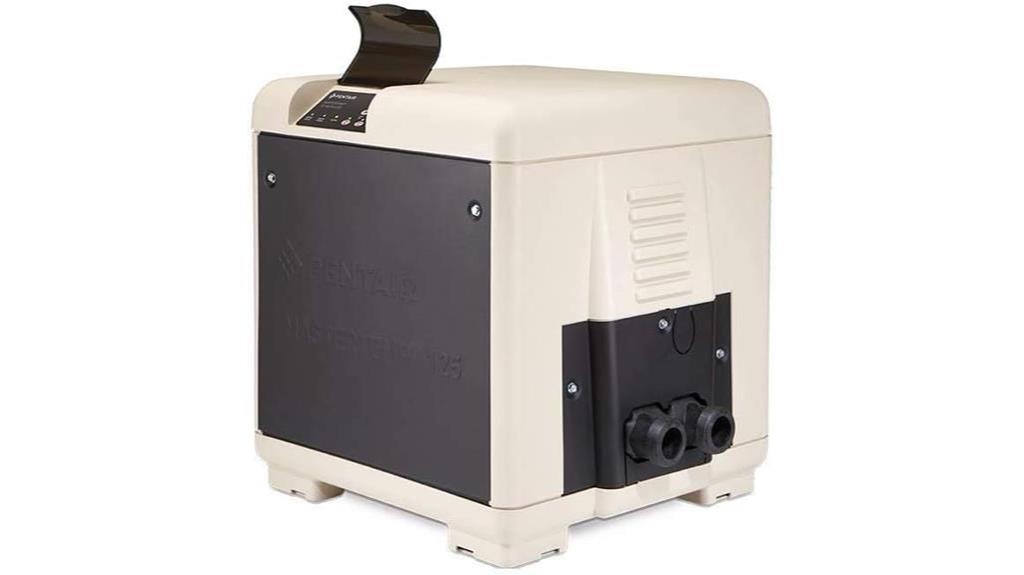
Designed specifically for small pools of up to 15,000 gallons, the Pentair MasterTemp 125,000 BTU Propane Gas Heater stands out for its impressive energy efficiency, boasting an 82% rating—the highest in its class. Its pre-mixed combustion technology guarantees quick heating, making it a practical choice for pool owners like me. Plus, the easy-to-use digital display/controller simplifies operation, so I can focus on enjoying my pool.
However, I've come across some concerning customer feedback. Many users report issues with units failing shortly after purchase and poor customer service when seeking support. While the heater's features are appealing, it's important to weigh these concerns before making a decision. Overall, it's a solid option for small pool heating needs.
Best For: Pool owners with small pools up to 15,000 gallons seeking an energy-efficient heating solution.
Pros:
- High energy efficiency with an 82% rating, making it cost-effective to operate.
- Quick heating capability due to pre-mixed combustion technology, allowing for faster pool enjoyment.
- User-friendly digital display/controller that simplifies operation and monitoring.
Cons:
- Reported reliability issues, with many units failing shortly after purchase.
- Poor customer service experiences, particularly regarding warranty support and parts availability.
- Installation and functionality issues, leading to dissatisfaction among some users.
Raypak 105,000 BTU Swimming Pool and Spa Heater – Propane
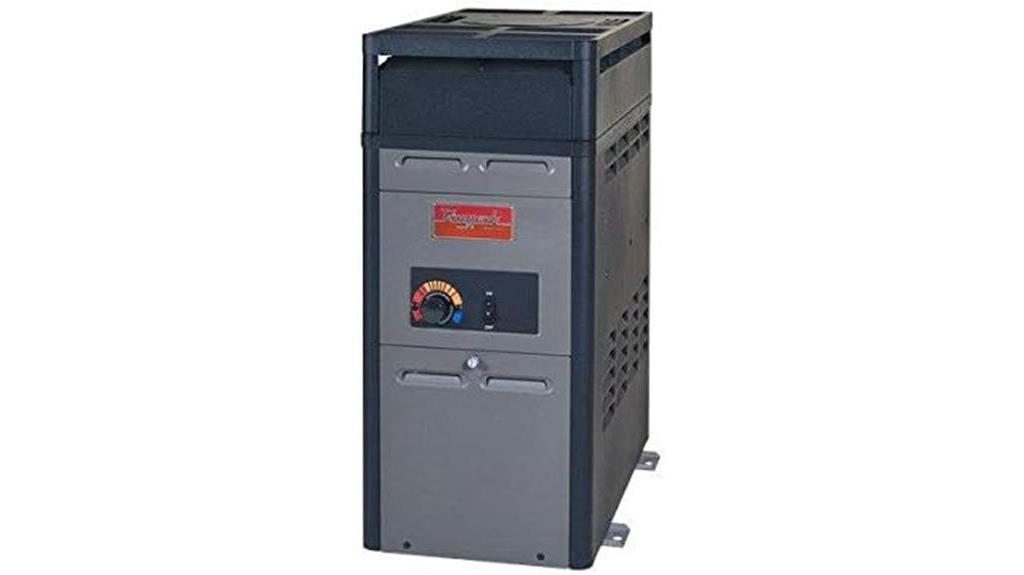
Looking for a reliable propane heater that fits both above ground pools and smaller in-ground pools? The Raypak 105,000 BTU Swimming Pool and Spa Heater might just be what you need. It's designed for easy installation, and I found its analog thermostat dial makes temperature adjustments simple and accurate. Weighing 85 pounds, it's compact yet powerful, ensuring quick heating for an extended swim season. However, customer feedback is mixed; while some users rave about the fast heating, others express concerns over reliability and customer service. I recommend having a professional installer set it up to avoid potential issues. Just keep in mind the warranty challenges reported by some customers before making your purchase.
Best For: Those seeking a compact and powerful propane heater for above ground or smaller in-ground pools and spas.
Pros:
- Easy installation with straightforward setup and access for servicing.
- Efficient heating capabilities, providing quick temperature increases for extended swim seasons.
- Convertible power options with both 120V and 240V compatibility.
Cons:
- Mixed reliability reports, with some customers experiencing issues shortly after purchase.
- Customer service challenges, including difficulties with warranty claims and support responsiveness.
- Potential damage during delivery, leading to complications in the purchasing experience.
Raypak 206,000 BTU Digital Electronic Ignition Propane Pool Heater
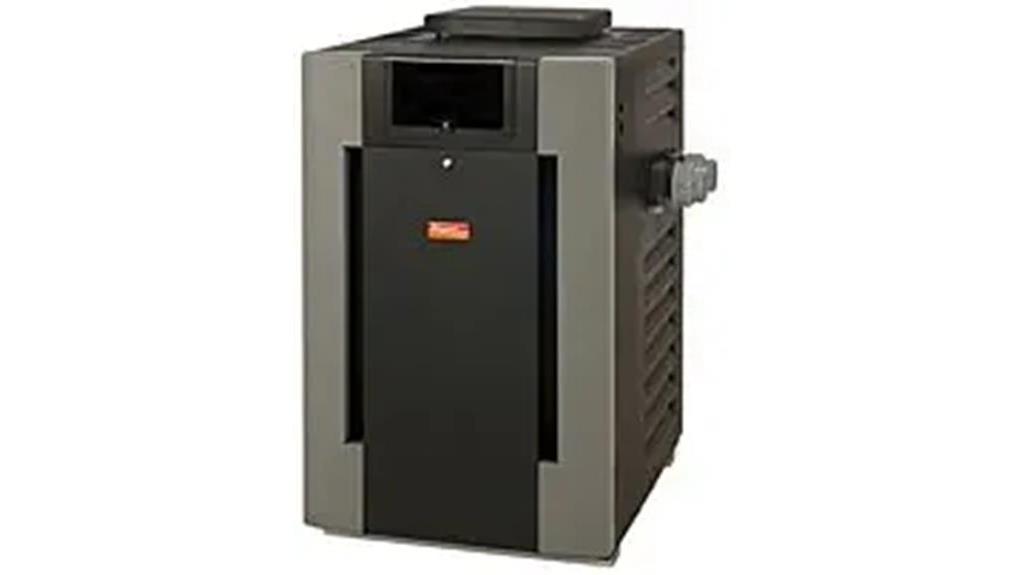
For homeowners seeking an efficient way to extend their swimming season, the Raypak 206,000 BTU Digital Electronic Ignition Propane Pool Heater stands out as an excellent choice. This powerful heater features electronic ignition and a microprocessor-controlled thermostat, ensuring precise temperature management for your pool or spa. With its robust design, including a rust-resistant cabinet and polymer headers, it's built to last in various outdoor conditions. I love that it can heat a 15,000-gallon pool from 80°F to 99°F in about 15 hours, making it perfect for last-minute swims. While some customers experienced ignition issues, many praised its quiet operation and ease of installation. Overall, it's a reliable option for extending your pool enjoyment throughout the season.
Best For: Homeowners looking for an efficient and durable solution to heat their pools and spas during extended swimming seasons.
Pros:
- Ease of Installation: Many users report straightforward setup, making it accessible for DIY enthusiasts.
- Quiet Operation: The heater operates quietly, enhancing the overall pool experience without disruptive noise.
- Durable Construction: Built with rust-resistant materials and a wind-resistant design, ensuring longevity in outdoor conditions.
Cons:
- Ignition Issues: Some customers have reported problems with the ignition system, which can affect performance.
- Customer Service Variability: Experiences with customer service support can be inconsistent, leading to frustrations for some users.
- Missing Parts on Delivery: There have been instances of missing components, such as the draft hood stack, upon arrival.
Factors to Consider When Choosing Propane Pool Heaters
When choosing a propane pool heater, you need to contemplate several key factors. Start with the heating capacity requirements to guarantee your pool stays warm enough for your enjoyment. Then, look at installation complexity, energy efficiency ratings, and maintenance support to find the best fit for your needs.
Heating Capacity Requirements
Choosing the right propane pool heater depends heavily on understanding heating capacity requirements. The heating capacity is typically measured in BTUs (British Thermal Units), with common capacities ranging from 105,000 BTU to 400,000 BTU. To efficiently heat your pool, aim for a heater that can raise the water temperature by about 1 degree Fahrenheit per hour for every 10,000 gallons of water.
Consider the surface area of your pool or spa, as larger pools usually need higher BTU ratings to maintain comfortable temperatures. Additionally, the elevation of your pool location can impact heating efficiency. Many heaters come with specific elevation ratings, so choose one that suits your environment for ideal performance.
While a higher BTU rating can lead to faster heating times, it's important to balance this with energy efficiency. This balance helps minimize fuel costs and reduces your environmental impact. By carefully evaluating these factors, you can select a propane pool heater that not only meets your heating needs but also operates efficiently throughout the season.
Installation Complexity
Understanding your heating capacity requirements sets the stage for the next important factor: installation complexity. When you choose a propane pool heater, consider that proper installation often requires professional assistance, especially for gas line setups. This guarantees safety and compliance with local regulations, so don't overlook the importance of hiring skilled help.
Many heaters come without ready-to-connect hose connectors, which can complicate the installation process. You might need to make additional purchases, adding to your overall costs. Users have reported mixed experiences; while some find the installation straightforward, others face significant challenges that lead to delays and increased expenses.
Additionally, you'll need to think about the weight and dimensions of the heater. It may require adequate space and the help of multiple people for safe handling. Finally, if issues arise shortly after setup, obtaining warranty support and customer service can be difficult, further complicating the installation process. By keeping these factors in mind, you can better prepare for what lies ahead and streamline the installation of your propane pool heater.
Energy Efficiency Ratings
Energy efficiency ratings play an important role in selecting the right propane pool heater for your needs. These ratings are usually measured by thermal efficiency percentage, meaning the higher the rating, the better the fuel utilization and lower your operational costs. Look for heaters with an efficiency rating of 82% or higher; they're among the most efficient in their class and can lead to significant energy savings over time.
The design of the heater also impacts its efficiency. Advanced heat exchangers and microprocessor-controlled thermostats optimize performance and minimize energy waste. Additionally, consider low NOx emissions, as models meeting stricter standards not only improve air quality but might also qualify for energy efficiency incentives.
Remember that energy efficiency doesn't just rely on the heater itself; regular maintenance and proper installation are vital for maximizing performance and longevity. By focusing on these factors, you'll guarantee that your investment in a propane pool heater pays off in both comfort and savings, keeping your pool warm all season long.
Maintenance and Support
When selecting a propane pool heater, maintenance and support should be high on your list of priorities. Regular checks on ignition systems, heat exchangers, and gas connections are vital to guarantee peak performance and safety. You'll want to stay proactive in your maintenance routine, as cleaning and inspecting for leaks can enhance the longevity of your heater and prevent costly repairs later on.
It's also important to pay attention to warranties. Many propane pool heaters only cover parts, so you may need to budget for potential labor costs associated with repairs. Understanding the warranty details and local service availability before purchasing can save you headaches down the road.
Moreover, customer service responsiveness plays a significant role in your maintenance experience. Delays in obtaining support or parts can lead to prolonged downtime, impacting your pool enjoyment. Users often report challenges with warranty claims, highlighting the need for clear communication and support from the manufacturer. By considering these factors, you can choose a propane pool heater that not only keeps your pool warm but also provides you with the necessary support when you need it most.
Fuel Consumption Considerations
Often overlooked, fuel consumption is an important factor to take into account when choosing a propane pool heater. Different units have varying fuel consumption rates, with larger models typically using more propane during initial heating phases. When evaluating options, pay attention to the BTU rating; higher ratings heat your pool faster but can lead to increased fuel usage.
To optimize fuel consumption, regular maintenance and monitoring of your pool's water chemistry are vital. This practice helps prevent corrosion and guarantees your heater operates at peak efficiency. Additionally, consider using larger propane tanks. They can maintain consistent pressure during operation, which minimizes fuel waste and enhances heating efficiency.
Don't forget about environmental considerations. Regulations may influence your choice, as low NOx emission systems meet specific fuel consumption and environmental standards, making them a more eco-friendly option. By taking these factors into account, you can choose a propane pool heater that not only keeps your pool warm but also manages fuel consumption effectively, saving you money and reducing your environmental impact.
Frequently Asked Questions
What Is the Average Lifespan of a Propane Pool Heater?
The average lifespan of a propane pool heater typically ranges from 5 to 15 years, depending on factors like usage, maintenance, and the quality of the unit. If you regularly clean and service your heater, you might extend its life. You should also consider the environment where it's installed, as extreme weather can affect longevity. Keeping an eye on performance can help you determine when it's time to replace it.
How Much Does It Cost to Install a Propane Pool Heater?
Installing a propane pool heater typically costs between $1,500 and $4,000, depending on the unit's size and complexity of the installation. You'll also need to factor in the cost of any necessary plumbing or electrical work. Don't forget about ongoing expenses like propane fuel and maintenance. It's a good idea to get multiple quotes from professionals to guarantee you're getting the best deal for your specific needs.
Are Propane Pool Heaters Environmentally Friendly?
Are propane pool heaters environmentally friendly? While they burn cleaner than many other fossil fuels, they still emit greenhouse gases. If you're looking for a more eco-friendly option, consider solar heaters or electric heat pumps. However, if you prioritize heating speed and efficiency, propane heaters can be a suitable choice. Just remember, every heating method has its environmental impact, so it is important to weigh your options and make an informed decision.
Can I Use My Propane Pool Heater Year-Round?
You can definitely use your propane pool heater year-round, enjoying warm swims in winter, spring, summer, and fall. By keeping the heater operational, you'll maintain a comfortable temperature, allowing for relaxing evenings and spontaneous pool parties. Just be sure to check local regulations and efficiency guidelines. Additionally, investing in a good pool cover can help retain heat, making your heater's job easier, and ensuring you get the most out of your investment every season!
How Do I Maintain My Propane Pool Heater?
To maintain your propane pool heater, start by regularly checking and cleaning the filters to guarantee peak performance. Inspect the burners for any debris or corrosion, and keep the area around the heater clear. Monitor the pressure and connections for leaks, tightening any loose fittings. It's also a good idea to schedule annual professional servicing to catch any potential issues early. Doing this keeps your heater running efficiently and prolongs its lifespan.
Wrapping Up
When it comes to choosing the right propane pool heater, remember that "you get what you pay for." Investing in a quality heater, like the ones mentioned, guarantees you'll enjoy warm, comfortable swims all season long. Keep in mind factors like BTU output and pool size to find the perfect fit for your needs. With the right choice, you'll transform your pool into a year-round oasis, making every dip a delightful experience. Happy swimming!